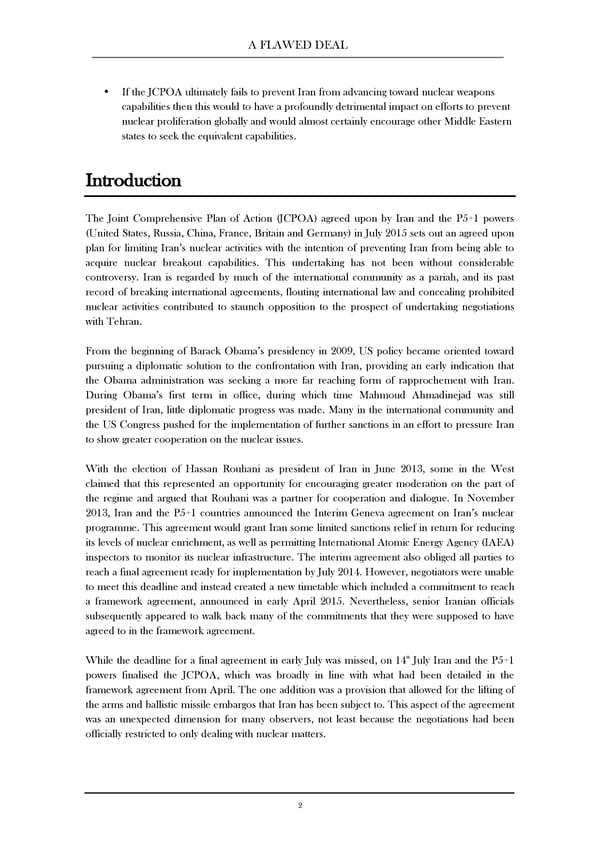! A FLAWED DEAL •! If the JCPOA ultimately fails to prevent Iran from advancing toward nuclear weapons capabilities then this would to have a profoundly detrimental impact on efforts to prevent nuclear proliferation globally and would almost certainly encourage other Middle Eastern states to seek the equivalent capabilities. Introduction The Joint Comprehensive Plan of Action (JCPOA) agreed upon by Iran and the P5+1 powers (United States, Russia, China, France, Britain and Germany) in July 2015 sets out an agreed upon plan for limiting Iran’s nuclear activities with the intention of preventing Iran from being able to acquire nuclear breakout capabilities. This undertaking has not been without considerable controversy. Iran is regarded by much of the international community as a pariah, and its past record of breaking international agreements, flouting international law and concealing prohibited nuclear activities contributed to staunch opposition to the prospect of undertaking negotiations with Tehran. From the beginning of Barack Obama’s presidency in 2009, US policy became oriented toward pursuing a diplomatic solution to the confrontation with Iran, providing an early indication that the Obama administration was seeking a more far reaching form of rapprochement with Iran. During Obama’s first term in office, during which time Mahmoud Ahmadinejad was still president of Iran, little diplomatic progress was made. Many in the international community and the US Congress pushed for the implementation of further sanctions in an effort to pressure Iran to show greater cooperation on the nuclear issues. With the election of Hassan Rouhani as president of Iran in June 2013, some in the West claimed that this represented an opportunity for encouraging greater moderation on the part of the regime and argued that Rouhani was a partner for cooperation and dialogue. In November 2013, Iran and the P5+1 countries announced the Interim Geneva agreement on Iran’s nuclear programme. This agreement would grant Iran some limited sanctions relief in return for reducing its levels of nuclear enrichment, as well as permitting International Atomic Energy Agency (IAEA) inspectors to monitor its nuclear infrastructure. The interim agreement also obliged all parties to reach a final agreement ready for implementation by July 2014. However, negotiators were unable to meet this deadline and instead created a new timetable which included a commitment to reach a framework agreement, announced in early April 2015. Nevertheless, senior Iranian officials subsequently appeared to walk back many of the commitments that they were supposed to have agreed to in the framework agreement. th While the deadline for a final agreement in early July was missed, on 14 July Iran and the P5+1 powers finalised the JCPOA, which was broadly in line with what had been detailed in the framework agreement from April. The one addition was a provision that allowed for the lifting of the arms and ballistic missile embargos that Iran has been subject to. This aspect of the agreement was an unexpected dimension for many observers, not least because the negotiations had been officially restricted to only dealing with nuclear matters. 2 ! !
 A Flawed Deal Page 4 Page 6
A Flawed Deal Page 4 Page 6